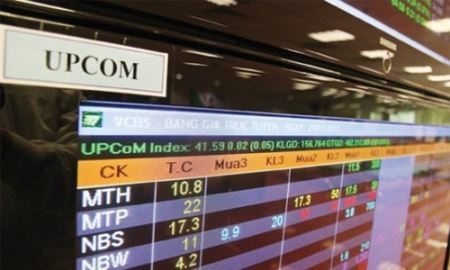Deadline for public companies and equitised enterprises to trade on UPCoM
 |
According to new rules it laid out, public companies which are not eligible for listing on the two stock exchanges and equitised enterprises must register for trading on UPCoM within 30 days from their registration as a public company.
Within 30 days of the last day of an initial public offering, unlisted public companies and equitised enterprises must register for trading on UPCoM.
The new rules were aimed at preventing eligible companies from avoiding listing and deliberately delisting, actions that could harm investors’ interests.
The authorities expect listing to improve the transparency and operational efficiency of companies.
Meanwhile, according to data released by the SSC on November 30, 2015, more than 1,000 public companies had listed neither on the stock exchange nor on UPCoM.
The new circular stipulates a deadline of December 31, 2016, for listing by companies that have not yet listed.
Because of this, many public companies, including joint stock banks, have been hastily completing the required procedures to list their shares to before the deadline.
By June this year shares of 686 companies had been traded on the two national stock exchanges, while the number on UPCoM stands at over 280.
What the stars mean:
★ Poor ★ ★ Promising ★★★ Good ★★★★ Very good ★★★★★ Exceptional
Latest News
More News
- IP alterations shape asset strategies for local investors (January 22, 2026 | 10:00)
- 14th National Party Congress: Vietnam - positive factor for peace, sustainable development (January 22, 2026 | 09:46)
- Japanese legislator confident in CPV's role in advancing Vietnam’s growth (January 22, 2026 | 09:30)
- 14th National Party Congress: France-based scholar singles out institutional reform as key breakthrough (January 21, 2026 | 09:59)
- 14th National Party Congress: Promoting OV's role in driving sustainable development (January 20, 2026 | 09:31)
- 14th National Party Congress affirms Party’s leadership role, Vietnam’s right to self-determined development (January 20, 2026 | 09:27)
- Direction ahead for low-carbon development finance in Vietnam (January 14, 2026 | 09:58)
- Vietnam opens arms wide to talent with high-tech nous (December 23, 2025 | 09:00)
- Why global standards matter in digital world (December 18, 2025 | 15:42)
- Opportunities reshaped by disciplined capital aspects (December 08, 2025 | 10:05)
















 Mobile Version
Mobile Version